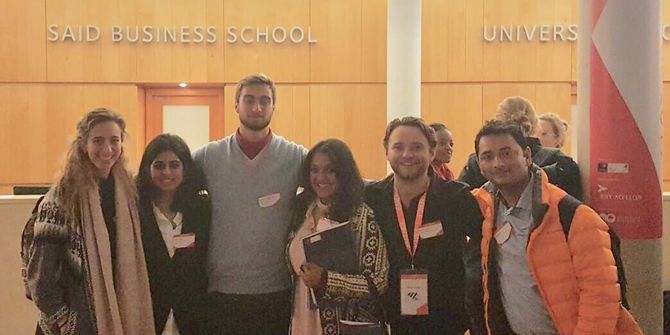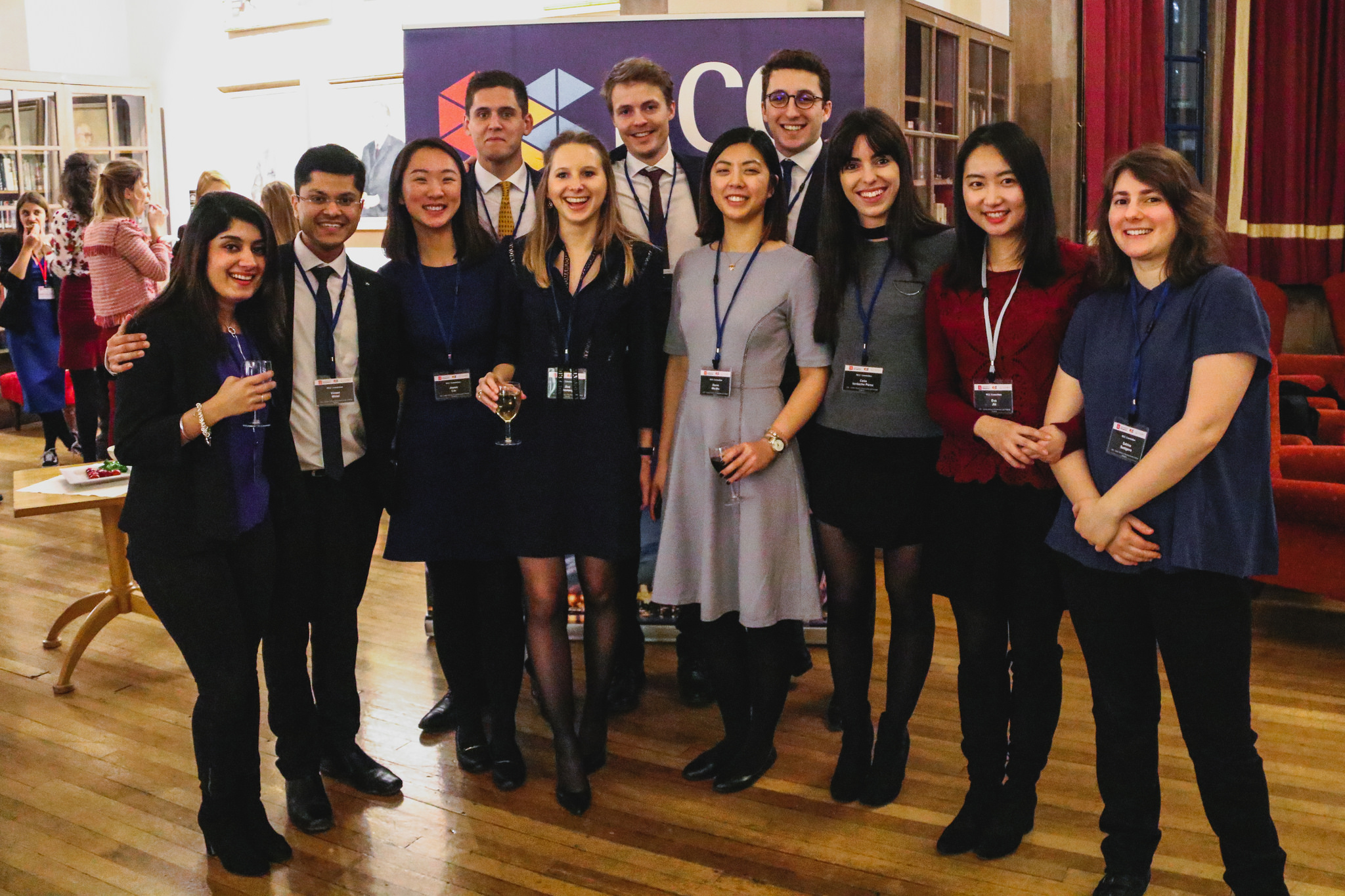Your degree is what you make of it – especially if you want to become a social entrepreneur. Social Innovation & Entrepreneurship MSc candidate Dylan Itzikowitz shares his advice for maximising your time at LSE and squeezing every last drop of value that London has to offer.
As part of my role as the elected student representative of our inaugural MSc in Social Innovation & Entrepreneurship, I’ve had dozens of conversations with prospective LSE applicants from across the globe.
Although this group of prospective students is diver, the questions are strikingly similar. It’s almost always ‘Is it worth it?’, ‘How can you study to be an entrepreneur from academics?’, and ‘Would you do it again?’ Interestingly, despite the fact that ‘Entrepreneurship’ is in the course title, few people in our cohort and in the prospective applicants I encounter want to launch their own venture. Our programme’s entrepreneurial focus isn’t about becoming Elon Musk, but rather on the creation of micro-entrepreneurs in emerging markets. It would have been helpful to have grasped this distinction before, but as part of the first cohort, I had no alumni to learn from.
Moving to London to study carries a massive financial and opportunity cost, so I always start the conversations by getting the applicant to ask themselves ‘why do you want to study here?’ and ‘what do you hope to get out of this degree?’ Instead of choosing a similar and more affordable domestic option, I opted to move from Canada to study this degree at LSE. Through numerous of my own ‘interviews’ with a diverse set LSE alumni, I gathered that the LSE’s value is in the brand it puts on your CV, the wide alumni network you become a part of, and the international diversity of your cohort. I’ve also found that the people who were aware of this from the start are generally the ones most satisfied with their experience.
Choosing the right degree is vital. If an applicant I speak with is solely concerned with academic learning and research, I strongly advise they look into 2-year master’s degrees. Although it’s a 12-month programme, they’re structured as six months of classes, exams, and then an independent research paper – making them ideal for budding academics. LSE is attempting to pivot away from a predominantly research-focused institution by launching numerous new management MScs, meaning that there is greater scope for those who are more interested in receiving knowledge rather than researching it.
Another important consideration is the academic culture. In the UK, the teaching style is more hands-off than in North America, usually with only one assessment per course at the end of the term. Since there’s more emphasis placed on being enterprising, less proactive students can end up with less interaction and feedback from professors. On the plus side, UK students enjoy ample free time throughout the two terms, including a month off in both December and April, to use however they please. There are even internships run during the aforementioned two month-long breaks, allowing students the opportunity to gain work experience before graduating. For others, this free time means completing weekly readings, exemplifying LSE’s ‘Let’s See Europe’ nickname through travelling and exploring London, or numerous nights spent at the pub. Always remember that your experience is what you make of it.
But for students looking for a specialized MBA and/or career-accelerator, the aforementioned activities simply won’t suffice. The LSE brand and alumni network are strong pulls, but to help future students maximize their return on investment, here’s my own personal guide for studying in London.
Firstly, the biggest competitive advantage LSE has over Oxbridge is its location. Yes, Oxbridge holds an un unparalleled international reputation and ability to attract practitioner speakers of the highest esteem. But these speakers and companies are generally based in London. To speak at Oxbridge is an all-day event, but a meeting near their office just requires 45 minutes of their time. Take advantage of this and set-up informal meetings with people from companies you’re interested in. To do this, utilize all social media channels. You do not have to be an LSE alumni to reach out to the alumni network. Once you’ve added LSE to your education on LinkedIn, you’ll be able to find the LSE alumni at any company. Obviously this doesn’t guarantee a useful interaction, but identifying that connection generally decreases the distance between you and the alumnus.
Another way to engage with someone is via Twitter, where I’ve found success tweeting accomplished individuals. If done respectfully, you have nothing to lose. Engage with who you have the most in common with, whether that is the MD or a first-year associate. And don’t be afraid to contact a CEO. It goes without saying that you should prepare for these meetings, with questions that couldn’t be answered by looking at their website. Take this as an opportunity to learn how these companies actually operate and what it is like to work there. These are things no lecture will teach you.

One thing I wish I had realized before partaking on a lot of these meetings is knowing when to ‘use your ask’. Although people are happy make an introduction, they probably won’t do it multiple times. If you don’t have anything to offer them in return, be sure to use your ‘ask’ for something that will be of high value. I was once rudely told that networking is a like a piggy-bank, if you put nothing in, there is nothing to take out. But if you make a good impression on this person, they become someone you could re-engage with for application advice should a position at their company become available.
Secondly, there are always events going on in London. Meet-Up is a platform where people post informal gatherings of all kinds. Whatever you’re interested in, there are likely regular free Meet-Ups. Although not all of the Meet-Ups will be of value, it’s worth exploring to find those that are helpful. There are great networking opportunities at funky co-working spaces like Google Campus, WeWork, and Bethnal Green Ventures. LSE itself offers no shortage of speakers and networking events. But while at an LSE-event everyone is from this university, at an external event you are the LSE student and much more memorable to the people you meet. Either way, when you do meet people, take their contact information rather than relying on them to reach out to you.
Thirdly, and my personal favorite, are the larger conferences run by corporate and academic institutions. These conferences often come with a steep entry fee, but usually have opportunities for volunteers. It is always worth emailing the organizers to explain you’re an interested and to offer to help in exchange for a ticket. Even more valuable than the free admission is the chance to build relationships with the speakers and organizers. And in my experience, the speakers always show more respect for those who hustle to be there. Since September, I’ve accessed Emerge social entrepreneurship conference in Oxford, Beyond Good Business in London, an event with the world-renowned NGO Educate Girls, 100%Open’s Innovation Union, and the Skoll World Forum. The collective entrance fees of these would be thousands of pounds. I would never otherwise be able to attend an invite-only conference on social entrepreneurship that carries a £5,000 price tag. But as a steward, I chaperoned 10 entrepreneurs from around the world, building relationships with accomplished people. My experience was possibly even more valuable than that of the privileged few who were invited to pay to be there.

In addition to professional network building, don’t discount the value of relationships with other students. It’s easy to stick with your course mates rather than branching out. But expanding your social circle to include students from other departments and universities will really diversify your experience. Equally, don’t be dissuaded from attending events just because they are being hosted by students from Oxbridge or other London universities. They can offer different perspectives, both professionally and socially. The universities may see themselves as competitors, but students generally see other students as collaborators.
As mentioned, LSE’s brand name holds weight, allowing us to attract speakers of the highest caliber. As a student you can exploit LSE’s reputation to organize your own events. Our cohort created a society to invite practitioners, entrepreneurs, and experts to come speak. Highly accomplished people were willing to come for free. But as a society, you are entitled to request funding to cover the costs of certain workshops. Inviting someone to speak is an easy way of establishing a relationship with them and allows you to curate your own learning experience. It can also help you to access lecturers outside of your programme. By inviting Aunnie Patton Powers to run an extracurricular workshop for us, we were able to access one of the Marshall Institute’s most esteemed lecturers.

LSE students have also created platforms to gain practical experience while studying. An example of this is Cognoscere Consulting, a postgraduate-run independent management consulting group that places students with London-based social enterprises. As an independently run organization for LSE students, it holds more weight than a society and serves as great opportunity to get real client-facing consulting experience.
Though the Careers department does not directly help students get employed, LSE Generate runs bi-annual start-up competition for LSE students and alumni. Even if you don’t foresee yourself pursuing the venture, going through the application rounds is a great practical exercise and the panel of judges are very established potential professional’s worth connecting with. Take advantage of the publication opportunities, either academically or through the student blog. Try to create tangible takeaways from your studies, so that your experience is distinct from others. To quote the illustrious Dave Chappelle, ‘we’re in the age of spin’. Construct a few ‘elevator pitches’ to showcase the value your degree has added. Hopefully, LSE will continue to create programmes to develop entrepreneurs, such as an incubation space and seed-fund as currently offered by its counterparts.
I’ll probably never be able to identify the true value of my investment in this degree. But I can say that studying at LSE has expanded my network globally and provided me the opportunity to take an entrepreneurial approach to my learning from a plethora of sources. I can’t say whether it will be worth the investment for everyone, but I can say that the experience is very much what you make of it. And if you rely exclusively on what you’re taught in lectures and from readings, you might one day regret it.
Learn more about our MSc Social Innovation and Entrepreneurship programme






